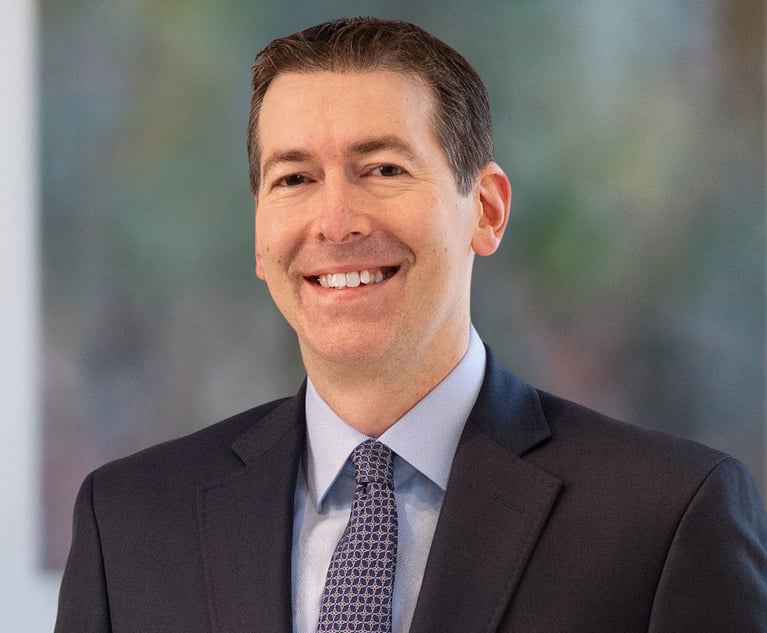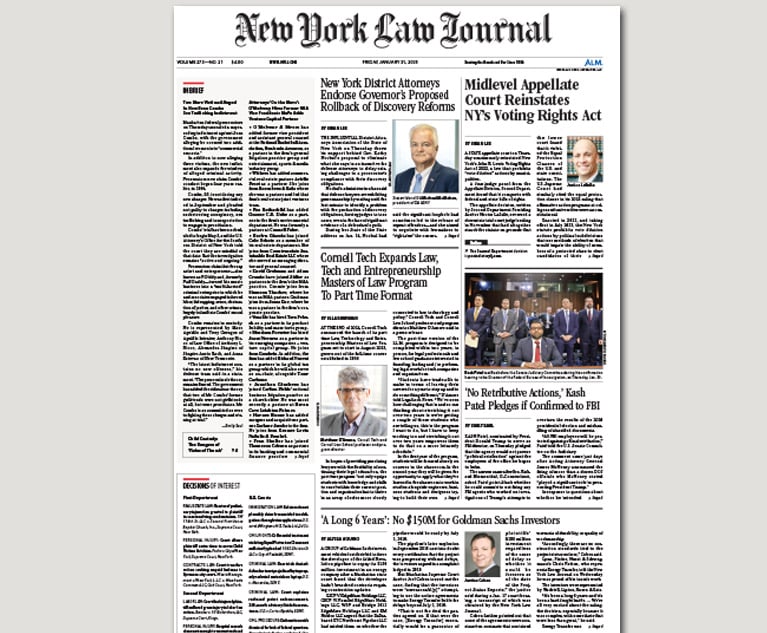A Year After Associate Salary Hikes, Added Expense Is Catching Up With Firms
Milbank set the increase in motion, Cravath, Swaine & Moore upped the ante, and others decided hiking pay was worth it to stay in the game.
May 15, 2019 at 03:37 PM
5 minute read
The original version of this story was published on The American Lawyer
 Image: Shutterstock
Image: Shutterstock
Over 100 large law firms increased associate salaries in 2018. Milbank set the increase in motion, Cravath, Swaine & Moore upped the ante, and others decided hiking pay was worth it to stay in the game.
Nearly a year later, data from the first quarter of 2019 suggests that the added expense pressure is beginning to catch up with many of these firms. In reports issued earlier this week, both Citi Private Bank and Thomson Reuters aggregated data from a number of firms and found that expenses, driven by lawyer compensation, grew in the mid-single digits, while demand was flat.
A handful of law firms at the top of the marketplace can shrug off these increases, at least for now. In normal market conditions, the demand for their expertise doesn't waver, and they have no trouble extracting 2,400 billable hours a year from their associates.
But that's a small field. And it leaves dozens of other firms navigating a marketplace where demand is wavering and costs are up.
“Associate compensation—that doesn't go away,” said Citi analyst David Altuna. “We do think that it's going to challenge profit growth.”
If demand were surging, it would be easier to push aside the issue for a future reckoning. That appears to be what happened in 2018, when the salary increases were unfurled during what turned out to be the strongest year for law firms since the Great Recession.
Now, with growing uncertainty about the global macroeconomic outlook, thanks to trade tensions, fears about China's economy, and the continuing fiasco that is Brexit, deal flows are down. Litigation appears to be holding steady after a 2018 that proved stronger than recent years, particularly for firms with niche practices, but there's no guarantee it will stay robust.
“Especially for those firms where demand is off, the expense of increased associate salaries is not helpful,” said Zeughauser Group analyst Kent Zimmermann.
The pressure from the increases extends beyond associate compensation, said the leader of one international law firm that increased salaries in 2019.
“Associate salaries are expenses of the business, and they've certainly gone up. But an indirect impact is that junior partner allocations or distributions or profit has had to go up,” said the leader, who spoke under conditions of anonymity to discuss financial issues.
The leader noted that when senior associates are earning $340,000 or $350,000 annually, with a $100,000 bonus, junior partners expect to earn even more than $440,00 or $450,000.
“The true owners of the business, the senior partners, they're now pressured two ways: the amount of profit and how you're sharing the profit,” the law firm leader said.
While the leader's firm has succeeded in growing demand over the first quarter, for others that haven't, options are limited and urgency is high.
“Many firms that took on the expense of increasing associate salaries can ill afford to be permissive of chronically underperforming practices, offices or lawyers, and can ill afford to be permissive of chronic excess capacity,” Zimmermann said.
With salaries and real estate serving as law firms' biggest financial obligations by far, other fixes will be of little consequence. Take client entertainment, which makes up just 4% of the budget at one firm.
“I could send an email tomorrow and say 'No lunches out' and it wouldn't make a difference,” the leader said.
One thing firms can control is associate's output, and paying young lawyers more money means smart firms will look to manage their performance more closely.
“There's going to be less tolerance for underperformance,” the law firm leader said.
Another wise long-term strategy, one that's yet to be embraced, would be to think about ways to break from the pack when the outliers hike salaries.
While firms insist they must resort to dollars to compete for top talent, “it's not economically justified,” said Bruce MacEwan, president of Adam Smith, Esq. “There are plenty of graduates out there from name-brand law schools who would work for less than $190,000.”
If firms could push aside the psychological impulse to match a small coterie of elite firms on salary in order to demonstrate they belong at the table, they could instead strategize about other ways to distinguish themselves in the race for talent. That could involve lifestyle adjustments like reduced billing expectations and overseas opportunities, along with secondments, and enhanced training.
Freed from the financial imperative to recoup every second of those overcompensated associates' time, firms could do things like sending young lawyers out off the clock to join partners in meeting with clients, MacEwan's colleague Janet Stanton noted.
This is not to ignore the very real of weight of student loan debt faced by most law school graduates, or the sacrifices they make for those fat paychecks. But recognizing that young lawyers follow incentives beyond money can only help identify other new methods of breaking from the pack, Stanton suggested.
“I just wish firms would be clear about who they are and what they need to do, rather than just be lemmings,” she said.
Read More
Inside Law Firms' Best Results in a Decade
Where Associate Salaries Soar, Signing Bonuses Fall, New Report Finds
This content has been archived. It is available through our partners, LexisNexis® and Bloomberg Law.
To view this content, please continue to their sites.
Not a Lexis Subscriber?
Subscribe Now
Not a Bloomberg Law Subscriber?
Subscribe Now
NOT FOR REPRINT
© 2025 ALM Global, LLC, All Rights Reserved. Request academic re-use from www.copyright.com. All other uses, submit a request to [email protected]. For more information visit Asset & Logo Licensing.
You Might Like
View All
Law Firms Expand Scope of Immigration Expertise Amid Blitz of Trump Orders
6 minute read

Orrick Hires Longtime Weil Partner as New Head of Antitrust Litigation
Trending Stories
- 1Uber Files RICO Suit Against Plaintiff-Side Firms Alleging Fraudulent Injury Claims
- 2The Law Firm Disrupted: Scrutinizing the Elephant More Than the Mouse
- 3Inherent Diminished Value Damages Unavailable to 3rd-Party Claimants, Court Says
- 4Pa. Defense Firm Sued by Client Over Ex-Eagles Player's $43.5M Med Mal Win
- 5Losses Mount at Morris Manning, but Departing Ex-Chair Stays Bullish About His Old Firm's Future
Who Got The Work
J. Brugh Lower of Gibbons has entered an appearance for industrial equipment supplier Devco Corporation in a pending trademark infringement lawsuit. The suit, accusing the defendant of selling knock-off Graco products, was filed Dec. 18 in New Jersey District Court by Rivkin Radler on behalf of Graco Inc. and Graco Minnesota. The case, assigned to U.S. District Judge Zahid N. Quraishi, is 3:24-cv-11294, Graco Inc. et al v. Devco Corporation.
Who Got The Work
Rebecca Maller-Stein and Kent A. Yalowitz of Arnold & Porter Kaye Scholer have entered their appearances for Hanaco Venture Capital and its executives, Lior Prosor and David Frankel, in a pending securities lawsuit. The action, filed on Dec. 24 in New York Southern District Court by Zell, Aron & Co. on behalf of Goldeneye Advisors, accuses the defendants of negligently and fraudulently managing the plaintiff's $1 million investment. The case, assigned to U.S. District Judge Vernon S. Broderick, is 1:24-cv-09918, Goldeneye Advisors, LLC v. Hanaco Venture Capital, Ltd. et al.
Who Got The Work
Attorneys from A&O Shearman has stepped in as defense counsel for Toronto-Dominion Bank and other defendants in a pending securities class action. The suit, filed Dec. 11 in New York Southern District Court by Bleichmar Fonti & Auld, accuses the defendants of concealing the bank's 'pervasive' deficiencies in regards to its compliance with the Bank Secrecy Act and the quality of its anti-money laundering controls. The case, assigned to U.S. District Judge Arun Subramanian, is 1:24-cv-09445, Gonzalez v. The Toronto-Dominion Bank et al.
Who Got The Work
Crown Castle International, a Pennsylvania company providing shared communications infrastructure, has turned to Luke D. Wolf of Gordon Rees Scully Mansukhani to fend off a pending breach-of-contract lawsuit. The court action, filed Nov. 25 in Michigan Eastern District Court by Hooper Hathaway PC on behalf of The Town Residences LLC, accuses Crown Castle of failing to transfer approximately $30,000 in utility payments from T-Mobile in breach of a roof-top lease and assignment agreement. The case, assigned to U.S. District Judge Susan K. Declercq, is 2:24-cv-13131, The Town Residences LLC v. T-Mobile US, Inc. et al.
Who Got The Work
Wilfred P. Coronato and Daniel M. Schwartz of McCarter & English have stepped in as defense counsel to Electrolux Home Products Inc. in a pending product liability lawsuit. The court action, filed Nov. 26 in New York Eastern District Court by Poulos Lopiccolo PC and Nagel Rice LLP on behalf of David Stern, alleges that the defendant's refrigerators’ drawers and shelving repeatedly break and fall apart within months after purchase. The case, assigned to U.S. District Judge Joan M. Azrack, is 2:24-cv-08204, Stern v. Electrolux Home Products, Inc.
Featured Firms
Law Offices of Gary Martin Hays & Associates, P.C.
(470) 294-1674
Law Offices of Mark E. Salomone
(857) 444-6468
Smith & Hassler
(713) 739-1250







